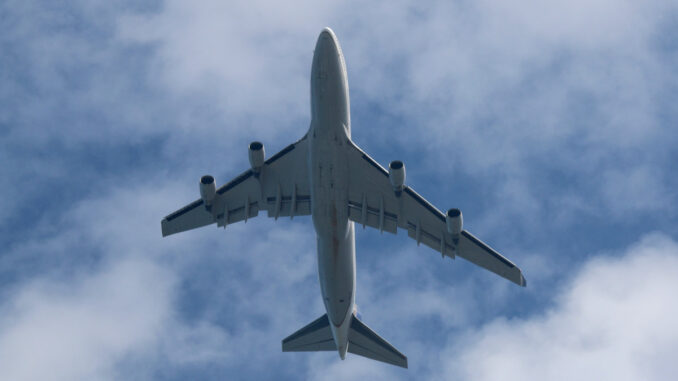
With the upcoming Labor Day holiday, throngs of travelers will head to the airport for a final summer getaway.
But, how many of those travelers are afraid to fly? Perhaps you’re among those who harbor such a concern.
Well, you are not alone.
Dr. Scott Symington is a licensed clinical psychologist and author of Freedom from Anxious Thoughts and Feelings: A Two-Step Mindfulness Approach for Moving Beyond Fear and Worry. Here is what he had to say on the issue.
What are the main reasons people cite for their anxiety about flying?
For many, it’s less about a fear of the plane going down, although this can be a primary source of anxiety for some, and more about how the experience makes them feel. Flying is associated with feeling anxious, trapped and out of control. People fear being endlessly stuck in a state of terror with no escape and no way to resolve the unbearable anxious state. And because air travel becomes automatically associated with anxiety, people start dreading and worrying about it in advance, which can be the most torturous aspect of flying—anxiously anticipating the upcoming flight.
Is it fair for people to be anxious about flying?
The threat center of the brain isn’t really concerned about fairness. It’s interested in keeping you alive by identifying and alerting you to potential or perceived threats. And when it does sound the alarm, you have the mental, emotional, and physical experience of being under threat—an experience that is very hard to ignore. The problem is our threat center, which is responsible for this fight-or-flight response, isn’t terribly bright and is trigger happy. It would rather falsely identify a potential threat than miss something that is genuinely a danger to you. Consequently, the fight-or-flight response can show up in spaces where it doesn’t belong, where the probability of a dangerous event is extremely low—not worthy of the anxious alarm. Air travel would fall in this category.
Have travelers always had anxiety about traveling or is this is a more recent occurrence? If so, why?
Based on polling and research studies, it appears aviophobia, a fear of flying, has stayed fairly consistent with prevalence rates of 2.5 percent to 6.5 percent of the general population. Of course, a fear of flying temporarily spikes after a major plane crash or a 9/11 event but then fear levels tend to return to a historical baseline.
What can travelers do to alleviate their concerns?
The first step is breaking any avoidance pattern, where you shift your mindset from avoiding flying to courageous action—being determined to face your fear and fly. On this journey towards freedom, focus on these 3 principles:
- Mindful Acceptance – flying offers you an opportunity to practice loss of control in a healthy way. Allow the uncomfortable feelings to be there without engaging in an internal tug-of-war with the unwelcome internal experience. Take some deep breaths, relax your muscles and say to yourself, I accept these feelings…I accept this current experience…I can live with this current feeling. This doesn’t mean you like the feelings or experience (or agree with the worries coming into awareness) but you move into nonresistance (take the fight out of it) because this is the fastest way to defuse the anxious energy.
- Healthy Distraction – especially when you’re on the flight, it’s important to leave your internal watchtower, where you’re intensely monitoring what’s happening in your body and on the plane, and release your body to feel what it needs to feel. Don’t try to keep the physiological symptoms under tight control. This will only extend the anxious physiology and fearful experience. To help you take this courageous step, utilize a healthy distraction, such an engaging novel or magazine, that is effective in holding your attention and life energy.
- Tap into Meaning & Purpose – it’s always easier to do a hard thing if it has meaning or purpose. Maybe you’re flying to be with family or to fulfill important professional responsibilities (work trip) or as an expression of freedom—a determination to live a full life unrestricted by fear. There’s a good reason you’re flying. Find it. Remind yourself of the important value or positive reason for taking on and enduring the hard experience.
Can travelers be “cured” of their anxiety, or is it something that will stay with them forever?
Over the years I’ve worked with dozens of clients who have gone from anxious, panicky flyers to flying with relative ease, where there’s little to no anxiety. For some of these individuals, air travel may never be a preferred, super comfortable experience but—if they face their fear and faithfully follow the steps outlined above—it ceases to be a significant source of distress in their life. So, yes, you can get over flying anxiety. Once the threat center of the brain no longer sees air travel as a life-threatening activity, which happens when you follow the above steps, it turns down the anxious dial.
What else would you like readers to know?
Anxiety is one of the most torturous disorders you can experience but it’s also one of the most treatable. You don’t have to stay stuck. We have more evidenced-based tools and strategies to address anxiety than any other condition. Whether it’s my book (Freedom from Anxious Thoughts & Feelings: A Two-Step Mindfulness Approach for Moving Beyond Fear & Worry) or some other resource, start moving towards freedom. Life is short. Go for it!


